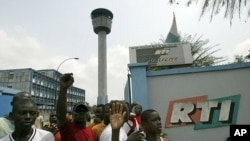Fighting between supporters of Ivory Coast's rival governments in the commercial capital Abidjan has knocked state-run television off the air. Government troops and rebels are also fighting for control of western provinces near the border with Liberia.
Smoke from the burning transmitters of state-run television drifts over the Abidjan skyline.
The national broadcaster, RTI, says technicians are working to restore the signal after its programs were "temporarily suspended' because of an attack on its transmission center in Abobo. That neighborhood is a stronghold of supporters of the U.N.-certified winner of November's vote, former prime minister Alassane Ouattara.
Renewed fighting in Abobo between Ouattara supporters and security forces loyal to incumbent president Laurent Gbabgo now enters its second week.
Government troops and rebels backing Ouattara are battling for control of areas that were previously part of a buffer zone in western provinces near the border with Liberia. Rebels say they captured two towns inside that zone late last week. Government troops say they are now battling to regain that territory.
U.N. Secretary General Ban Ki-moon says that fighting, coupled with clashes in the political capital Yamoussoukro and running battles here in Abidjan, is a disturbing escalation of the crisis that risks reigniting civil war.
Mr. Gbagbo's government says U.N. troops killed a police officer Friday. Gbagbo youth leader Charles Ble Goude says Gbagbo supporters are organizing to block the movement of U.N. peacekeepers who he says are helping to transport rebel forces.
Within the week, Goude says Gbagbo supporters will take control of the hotel where Ouattara's living, which is guarded by U.N. peacekeepers.
The U.N. mission here is condemning what it calls a new style of propaganda by Gbagbo supporters. It denies killing a police officer or transporting rebel forces, saying what it calls these wicked lies are intended only to create hatred among Gbagbo supporters to prevent the United Nations from protecting civilians.
The political standoff in the world's largest cocoa grower has pushed cocoa futures to 32-year highs as sanctions against the Gbagbo government drive down the economy.
There is a shortage of cooking gas. The national refinery is having trouble buying crude. The regional central bank cut off Gbagbo's government, forcing many foreign banks to close and raising questions about soldier and civil servant salaries for February.
Before RTI went off the air, the Ministry of Economy and Finance announced that everyone has been paid into new accounts opened at banks the government has nationalized. It released a Monday-through-Thursday schedule for government workers to report to specific banks to receive their salaries.
Starting next Monday, the ministry says civil servants and soldiers will be able to access their new accounts any time they like.
Gbagbo's government has made great use of the national broadcaster since the constitutional council announced his re-election, after annulling as fraudulent nearly 10 percent of all ballots cast. The government has aired a steady stream of commentary denouncing Ouattara and the international community, especially France.
The European Union and the United Nations have both condemned RTI for inciting violence. Given the extent of the fire at its transmitter, the station may be off the air for some time, especially if the economic blockade makes it more difficult to acquire replacement parts.
